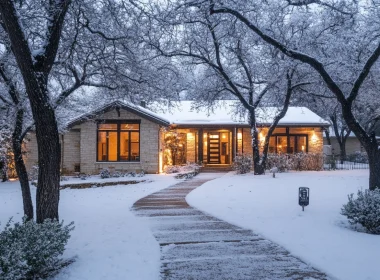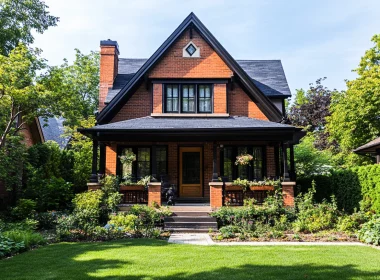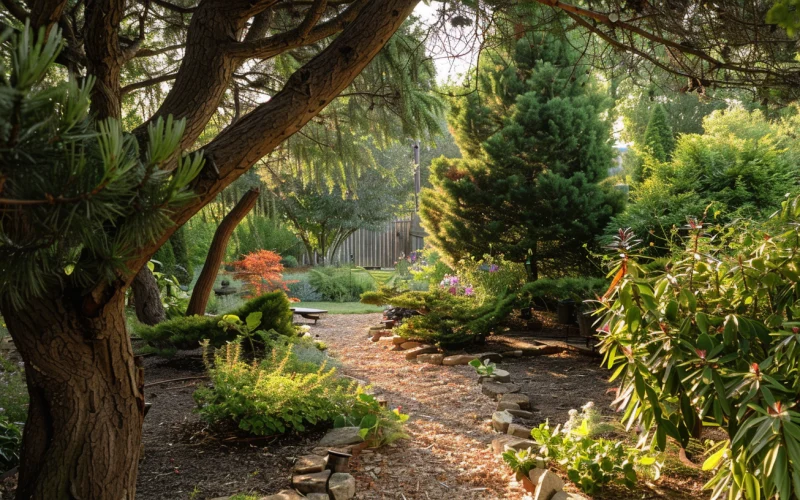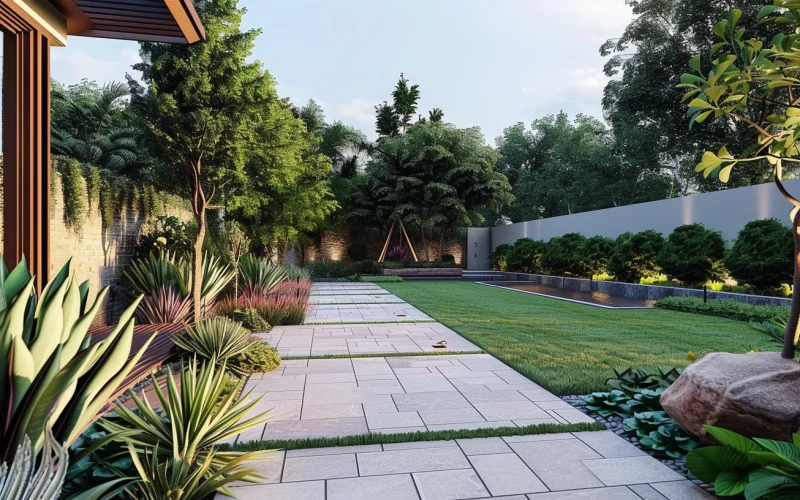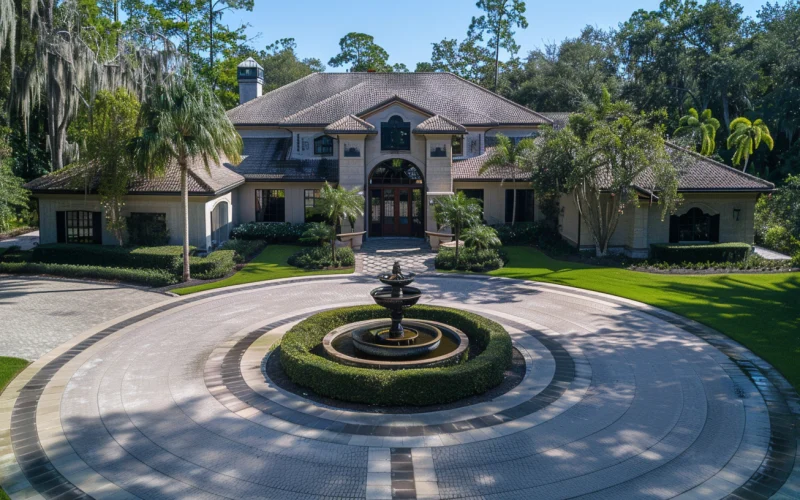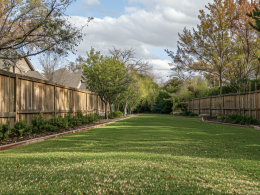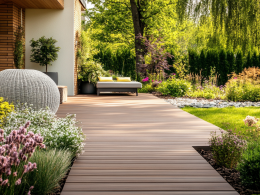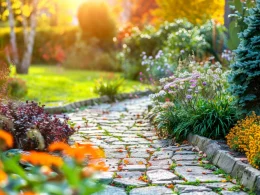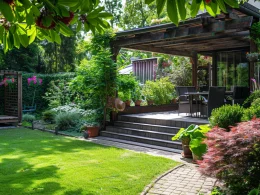Many homeowners prioritize creating a private and tranquil front yard, and modern front yard fence ideas often incorporate lush plant privacy screens.
These living barriers provide a natural boundary between your property and the outside world, adding beauty, texture, and serenity to your outdoor space.
Choosing the right plants for your privacy screen involves considering growth rate, mature size, foliage density, and adaptability to your specific climate and soil conditions.
This blog post will explore the ten best plants for creating privacy screens, from classic evergreens to fast-growing bamboo and flowering shrubs.
Whether you prefer the timeless elegance of a formal hedge or the relaxed charm of an informal mixed border, there’s a perfect plant combination to suit your modern front yard fence ideas and create the private oasis you’ve always desired.
1. Arborvitae
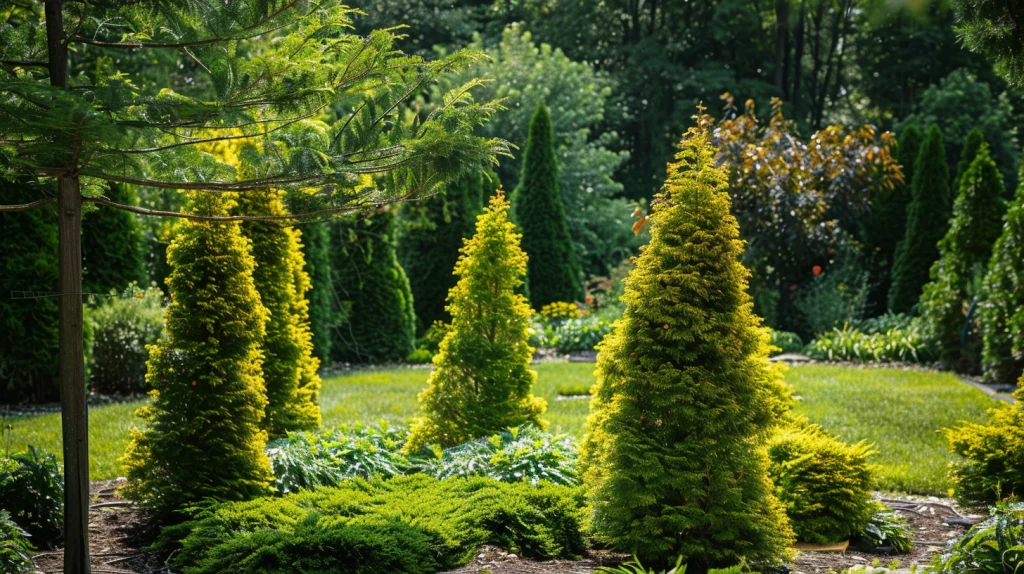
Arborvitae is a go-to choice for homeowners seeking a tall, dense, and evergreen privacy screen.
The Green Giant and Emerald Green cultivars are particularly well-suited for this purpose, as they can reach impressive heights of 20-30 feet and widths of 8-12 feet at maturity.
These conical-shaped trees have soft, feathery foliage that maintains its rich green color year-round.
Arborvitae thrives in full sun to partial shade and is adaptable to various soil types, making it a versatile option for many landscapes.
When planting arborvitae for a privacy screen, space the trees 3-4 feet apart to allow optimal growth and coverage.
2. Bamboo
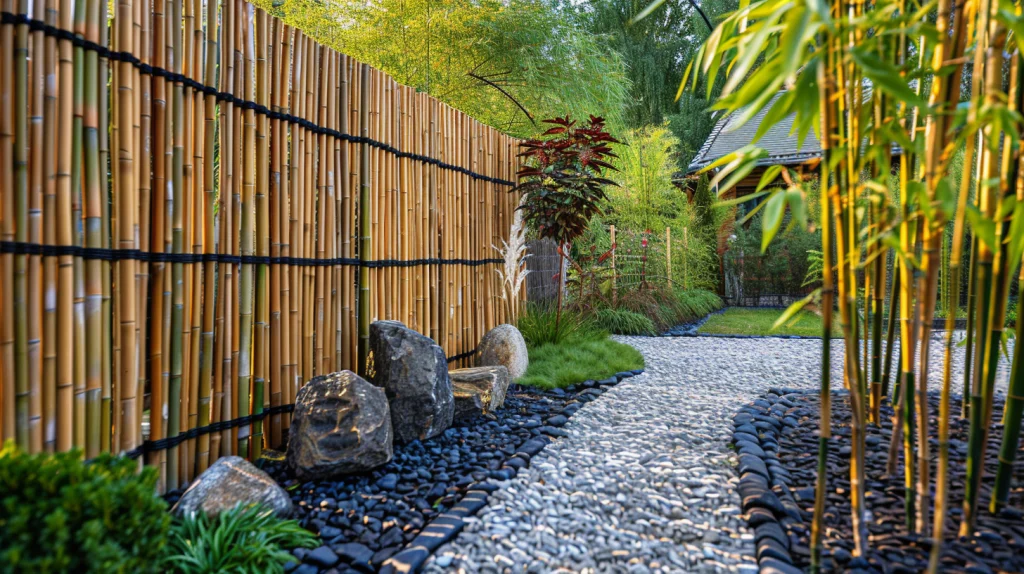
Bamboo is an excellent choice for those looking to create a privacy screen quickly and add an exotic flair to their landscape.
Clumping bamboo varieties, such as Fargesia and Bambusa, are preferred for privacy screens because they don’t spread aggressively like their running counterparts.
These fast-growing plants can reach heights of 20-30 feet and widths of 6-8 feet, with some species growing up to 3-5 feet per year.
Bamboo’s slender, upright stems and lush foliage create a dense, tropical-looking screen that provides privacy and a unique aesthetic appeal.
When planting bamboo, choose a location with well-draining soil and provide regular watering, especially during the establishment phase.
Additionally, consider planting bamboo in a protected area to minimize damage from strong winds.
3. Privet
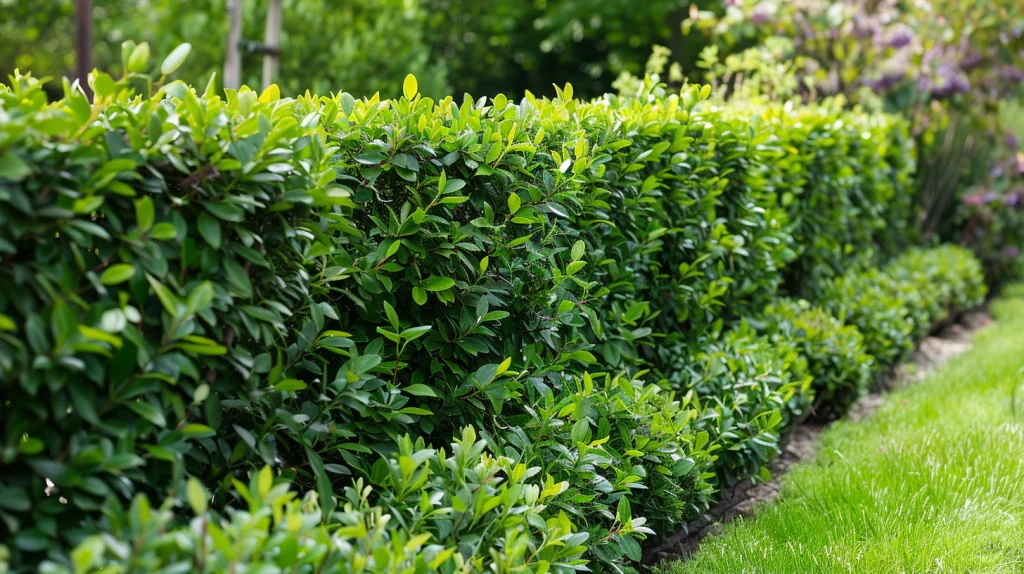
Privet is a classic hedge plant used for centuries to create formal and informal privacy screens.
Depending on the species and climate, this versatile shrub can be either deciduous or evergreen and features small, glossy leaves that form a dense, compact hedge.
Privet is relatively fast-growing, with most species reaching heights of 8-12 feet and widths of 4-6 feet at maturity.
It is adaptable to various soil types and can tolerate both full sun and partial shade, making it a low-maintenance option for many landscapes.
4. Laurel
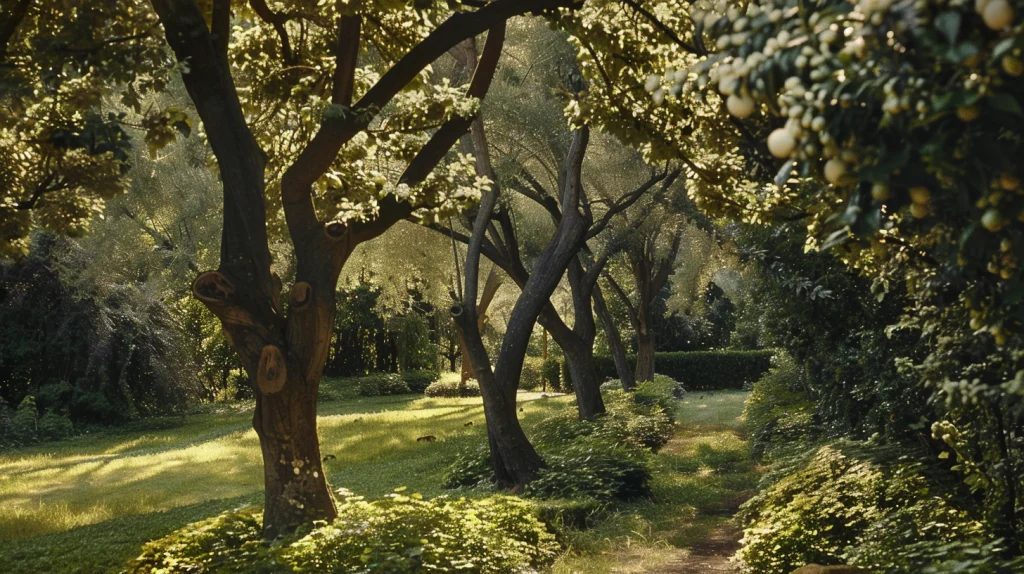
Laurel, also known as cherry laurel or English laurel, is a large evergreen shrub that can create a lush, dense privacy screen with its sizeable, glossy leaves.
This fast-growing plant can reach heights of up to 20 feet and widths of 10 feet, making it suitable for tall hedges or screens.
Laurel prefers well-draining soil and can tolerate sun and shade, although it may appreciate some afternoon shade in hot climates.
When planting laurel for a privacy screen, space the shrubs 4-5 feet apart for proper growth and coverage.
Laurel can be pruned to maintain a formal shape or left to grow naturally for a more relaxed, informal look.
Remember that laurel produces small white flowers in spring, followed by black berries that can attract birds to your yard.
5. Juniper
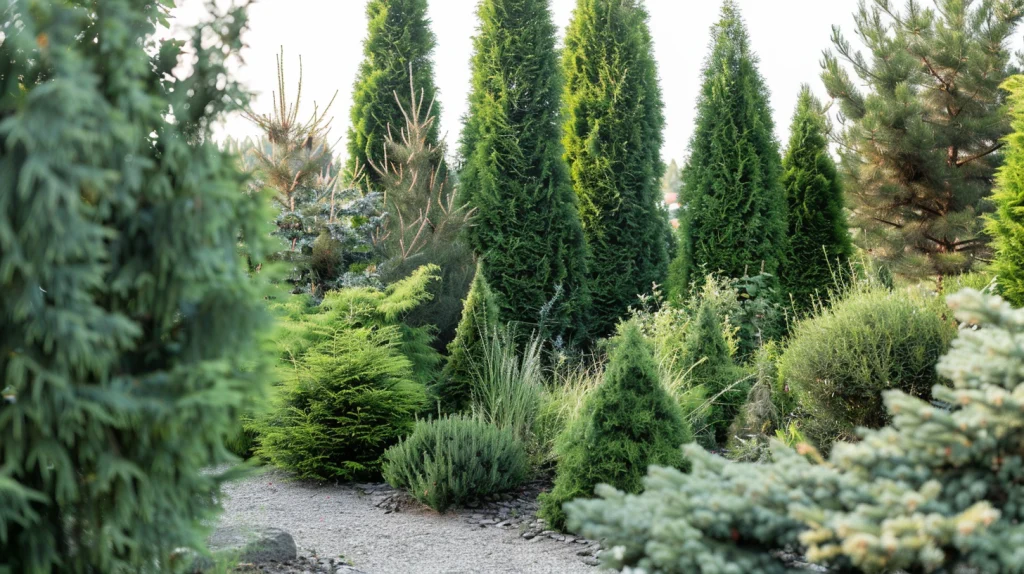
Junipers are versatile evergreen shrubs or trees with a wide range of growth habits, making them suitable for various hedge heights and styles.
Some popular varieties for privacy screens include the tall, narrow Skyrocket juniper, which can reach heights of 15-20 feet and widths of 2-3 feet, and the dense, spreading Pfitzer juniper, which can grow 4-6 feet tall and 6-8 feet wide.
Junipers are drought-tolerant and prefer well-draining soil, making them a low-maintenance option for many landscapes.
When planting junipers for a privacy screen, space them according to their mature size, typically 3-5 feet apart for larger varieties and 2-3 feet apart for smaller ones.
Junipers can be pruned to maintain a desired shape or left to grow naturally, creating a more organic and textured privacy screen.
6. Cypress
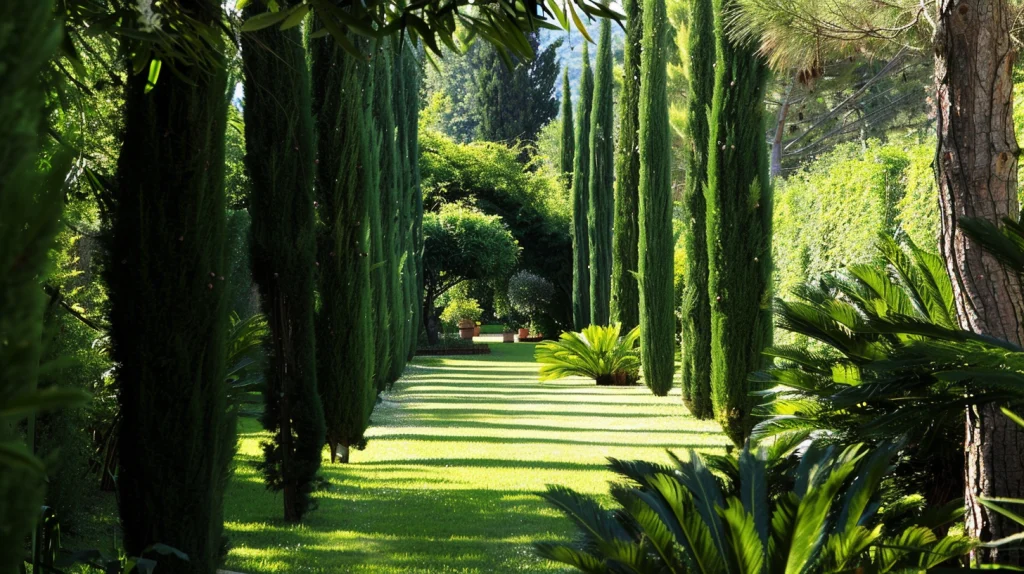
Cypress trees are another excellent option for creating tall, dense privacy screens with their evergreen, feathery foliage.
The Leyland cypress is a popular choice, as it can grow up to 3-4 feet per year, reaching ultimate heights of 60-70 feet and widths of 15-25 feet.
This fast-growing tree is best suited for large properties with ample space to mature.
The Italian cypress offers a more compact option for smaller landscapes, growing 20-30 feet tall and 2-3 feet wide.
Cypress trees prefer full sun and well-draining soil, and they can tolerate a range of climates.
7. Holly
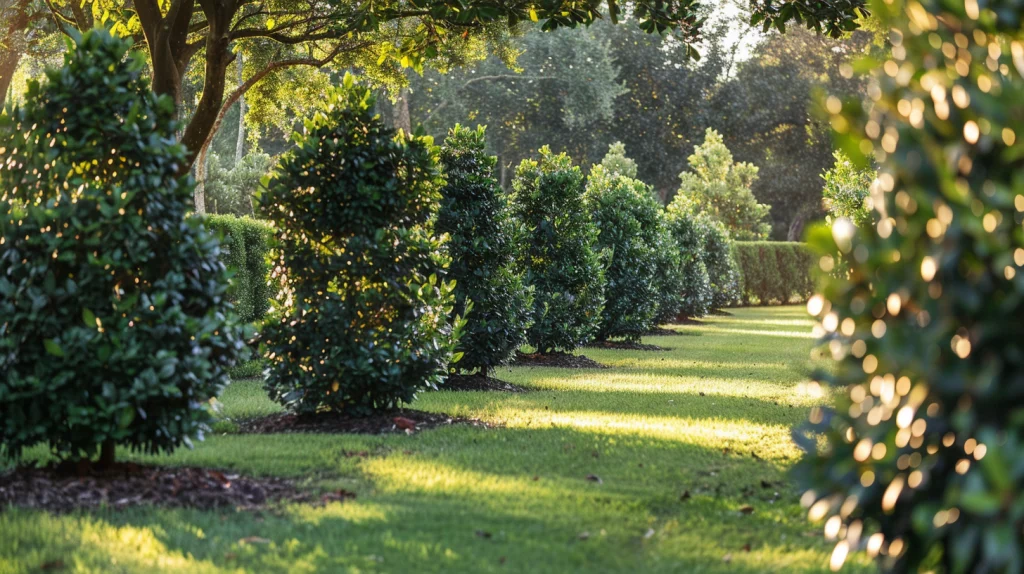
Holly is a versatile evergreen shrub or tree with glossy, spiny leaves and bright red berries that can add privacy and visual interest to your landscape.
Numerous holly species and cultivars are available, ranging in size from compact shrubs to large trees.
The American holly can grow 20-30 feet tall and 10-15 feet wide, while the Japanese holly typically reaches heights of 6-10 feet and widths of 4-6 feet.
Hollies prefer well-draining soil and can tolerate both sun and partial shade.
When planting holly for a privacy screen, space the plants according to their mature size, typically 4-6 feet apart for larger varieties and 2-3 feet apart for smaller ones.
Remember that most holly species have separate male and female plants, so you must plant both to ensure berry production.
8. Boxwood
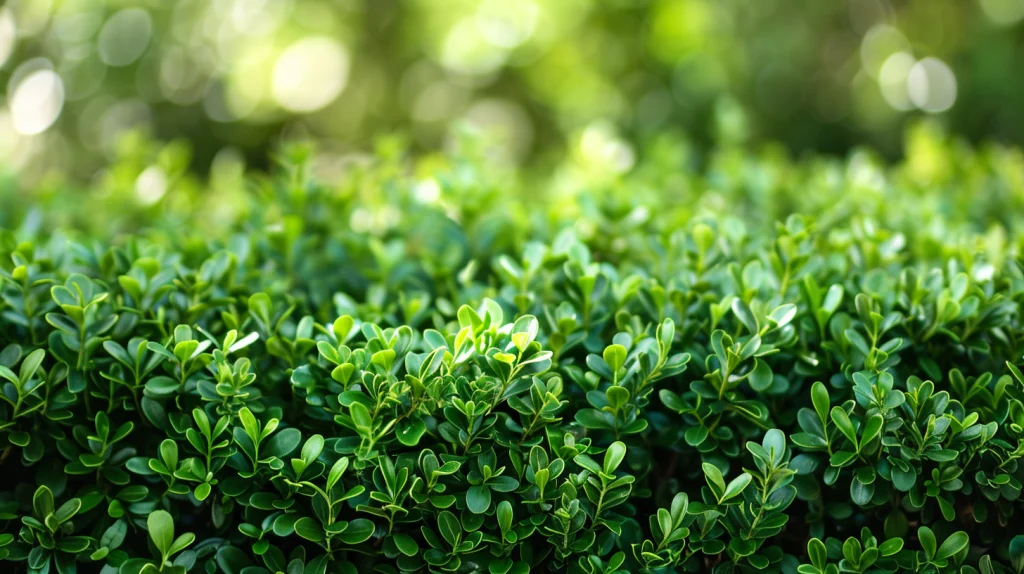
Boxwood is a classic evergreen shrub often used for low to medium-height formal hedges and privacy screens.
These compact plants have small, glossy leaves and a dense, rounded growth habit, making them ideal for creating tidy, sculptured borders.
Boxwood species vary in size, with common varieties reaching heights of 2-4 feet and widths of 2-3 feet.
Boxwood prefers well-draining soil and can grow in sun or partial shade. When planting boxwood for a privacy screen, space the shrubs 1.5-2 feet apart to create a dense hedge.
Regular trimming is essential to maintain your boxwood screen’s desired shape and size, as these shrubs can become overgrown without proper maintenance.
9. Lilac
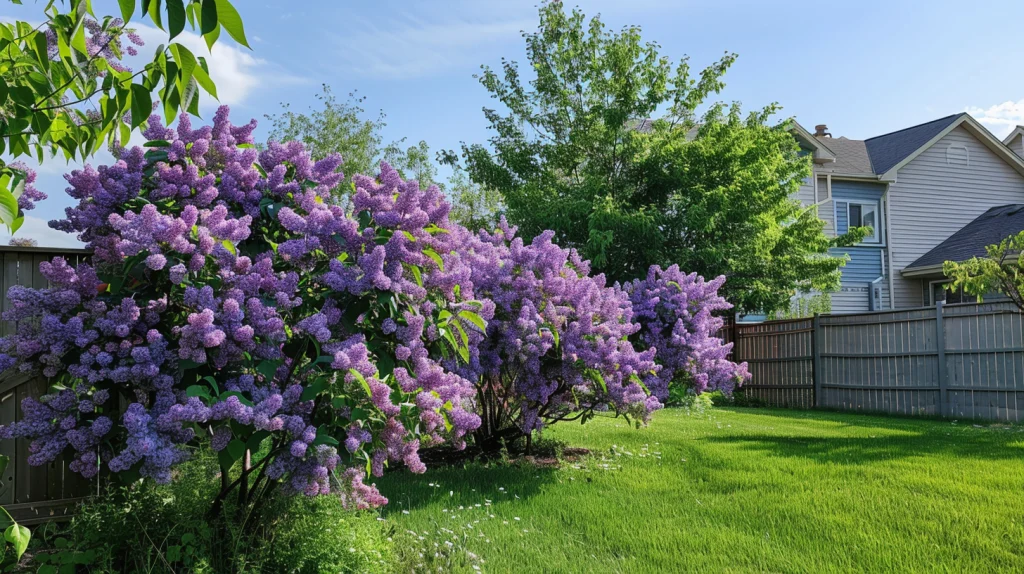
Lilacs are beloved deciduous shrubs offering privacy and stunning fragrant blooms in the spring.
Common lilac varieties can grow 8-15 feet tall and 6-12 feet wide, making them suitable for informal privacy screens.
These shrubs have heart-shaped leaves that provide a lush, green backdrop throughout the growing season. In the spring, their purple, pink, or white flower clusters add a burst of color and aroma.
Lilacs prefer full sun and well-draining soil; they are relatively low-maintenance once established.
When planting lilacs for a privacy screen, space the shrubs 6-8 feet apart to allow for proper growth and airflow.
Remember that lilacs can take a few years to reach their mature size and may require occasional pruning to maintain their shape and vigor.
10. Yew
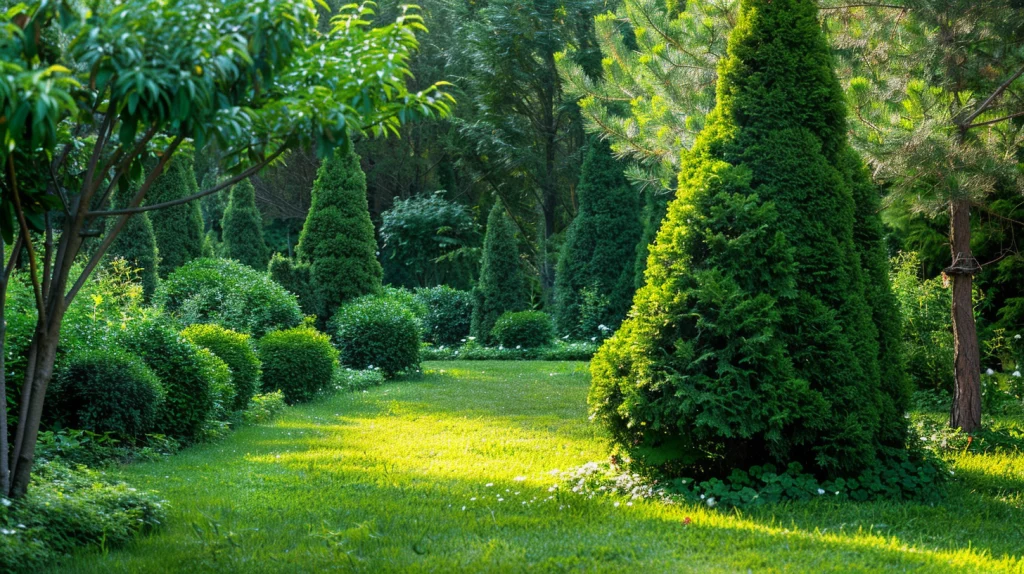
Yews are versatile evergreen shrubs or trees that, with their dark green, needle-like foliage, can create dense, attractive privacy screens.
Several yew species and cultivars are available, ranging in size from low-growing spreaders to tall, upright trees.
The English yew can reach heights of 20-30 feet and widths of 10-15 feet, while the Hicks yew typically grows 8-10 feet tall and 3-4 feet wide.
Yews prefer well-draining soil and can tolerate both sun and shade, making them adaptable to various landscape conditions.
When planting yews for a privacy screen, space the plants according to their mature size, typically 3-4 feet apart for larger varieties and 2-3 feet apart for smaller ones.
Yews can be pruned to maintain a formal shape or left to grow naturally for a more organic look.
Conclusion
Creating a beautiful and functional privacy screen using plants is an excellent way to enhance your modern front yard fence ideas and transform your outdoor space into a secluded retreat.
By carefully selecting plants based on their growth habits, foliage density, and adaptability to your specific climate and soil conditions, you can design a living wall that provides privacy and visual appeal.
Whether you opt for the timeless beauty of arborvitae, the fast-growing charm of bamboo, or the seasonal interest of deciduous shrubs like lilac, there’s a perfect plant combination to suit your unique landscape and style preferences.
Remember to consider the mature size of your chosen plants and space them accordingly. Don’t be afraid to mix different species for a more natural and diverse look.
Your plant privacy screen will thrive in your front yard for years with proper planning, planting, and care. Happy Gardening

